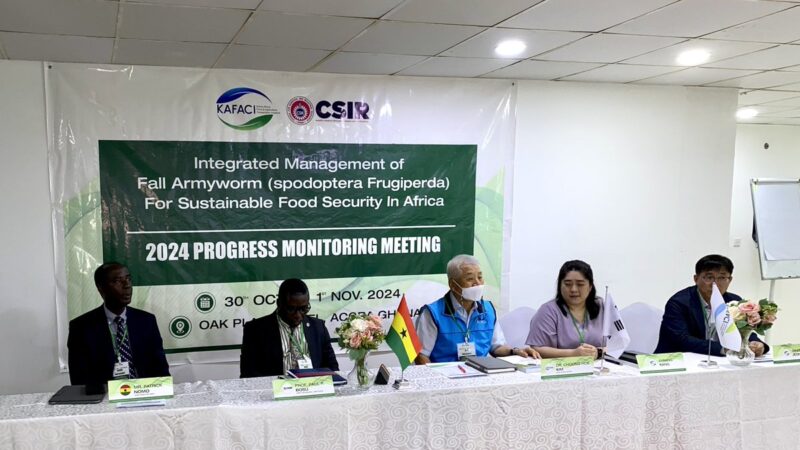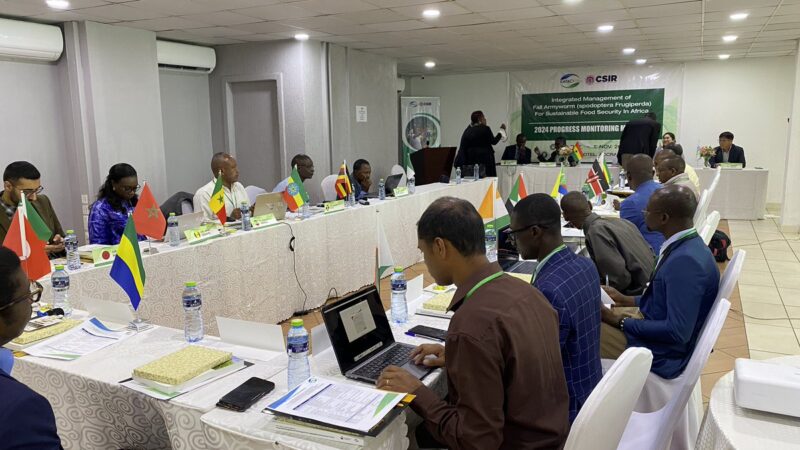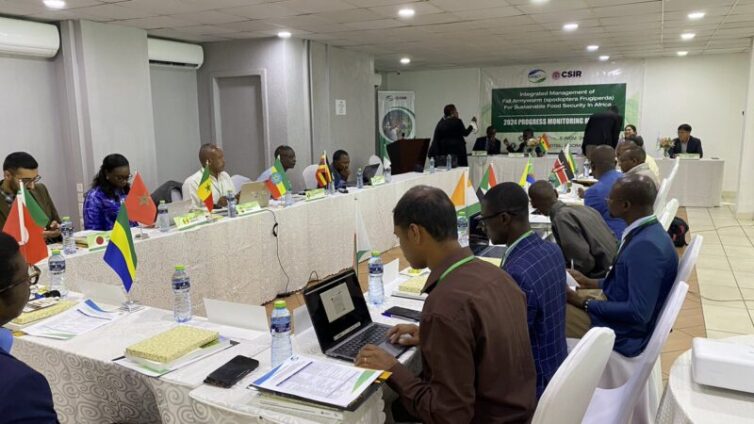
Audio By Carbonatix
Ghana is at the forefront of a significant initiative to tackle the invasive fall armyworm pest, as African countries gather in Accra to assess progress made under the Korea-Africa Food and Agriculture Co-operation Initiative (KAFACI).
The fall armyworm, known for its capacity to inflict substantial damage on maize crops, an essential staple across the African continent, first caused considerable alarm in Ghana in 2016 and 2017.
In response to this crisis, Ghana’s Council for Scientific and Industrial Research (CSIR) with its 13 institutes swiftly mobilized resources and expertise to develop sustainable management solutions, with KAFACI providing financial backing for the timely implementation of their initiatives.
Addressing 16 principal investigators during the 2024 annual progress monitoring meeting, Professor Paul Bosu, Director-General of CSIR, articulated the critical importance of combating fall armyworm (Spodoptera frugiperda) and ensuring national and continental food.

With the fall armyworm recognized as a major threat since its outbreak, leading to widespread distress among farmers, the meeting took stock of strategies employed to manage this agricultural crisis.
Prof. Bosu emphasised that the pest had wreaked havoc on food security across the African continent, particularly jeopardizing maize production.
Under the guiding principle of “taming nature with nature,” the CSIR research team has developed environmentally friendly pest management practices.
These innovations contribute not only to immediate agricultural needs but also aim to foster long-term resilience in food production systems across Africa.
CSIR swiftly mobilized its resources following the initial invasion, which prompted immediate concern for food security within Ghana and beyond.
The support of KAFACI and its financial backing proved essential for the timely intervention efforts that have facilitated sustainable solutions.
At the progress meeting, Prof Bosu also shed light on the notable achievements made over the past five years, not only in Ghana but also across 15 other African nations, including Madagascar, Nigeria, and Zambia.
He commended the participating governments for their commitment to providing the necessary infrastructure and support to advance research initiatives aimed at mitigating the impacts of fall armyworm infestations.
The collaboration with international organizations, particularly the Republic of Korea’s Rural Development Administration (RDA), has bolstered research and development in areas such as integrated pest management, crop resilience, and innovative agricultural practices.
An exciting element of this partnership is the KAFACI Young Scientist Award, which seeks to nurture the next generation of researchers in agriculture by allowing them to gain valuable insights and exposure to advanced technologies in Korea.
Rev. Dr. Patrick Numo, Chief Director of the Ministry of Environment, Science, Technology and Innovation, also addressed the gathering, underscoring the importance of science and research as drivers of national development.

He echoed the urgent need to develop strategies not only for pest management but also to address climate change effects affecting agriculture, asserting the government’s commitment to investing in sustainable agricultural development through agencies like CSIR.
The fall armyworm's persistence and the rising incidence of pest outbreaks, coupled with overreliance on chemical pesticides, pose significant challenges to human health and food safety.
Dr. Numo emphasized that developing environmentally friendly pest management practices is critical and commended CSIR’s innovative integrated pest management strategies, which aim to reduce reliance on chemicals and promote sustainable agricultural practices.
As stakeholders continue to share knowledge and strategies during the retreat, there is growing optimism about the lasting impact of the project, particularly for smallholder farmers whose livelihoods depend on resilient and sustainable agricultural practices.
Also, the successful management of the fall armyworm epidemic can serve as a vital stepping stone toward enhancing food security and establishing a more robust agricultural economy in Ghana and across the African continent.
Latest Stories
-
Karaga MP donates 4,000 gallons of fuel to boost livelihoods in New Year outreach
3 hours -
GIPC CEO engages European Parliament delegation on Ghana’s investment reforms
3 hours -
Oppong Nkrumah, 5 others didn’t accept campaign support from Bryan Acheampong – Pius Hadzide backtracks
4 hours -
BoG rejects market speculation, emphasises data-driven policies
4 hours -
BoG targets consolidation, discipline in 2026 policy direction
5 hours -
GJA-Ashanti commends EPA’s continuous engagement with journalists who were involved in accident
5 hours -
Wenchi needs development, help us – Chiefs to Aseidu Nketia
5 hours -
EPA boss encourages journalists not to relent in their support to fight galamsey
5 hours -
Domestic Gold Purchasing Programme helped Ghana’s economy during difficult period – IMF
5 hours -
Ike City Group of Companies touches hearts at Dzorwulu Special School with compasionate donation
6 hours -
Vehicle exhaust pipes on the left create about 40% more pollution on the road than those on the right – Study
6 hours -
My Response to Dr Bryan Acheampong: Facts must prevail
6 hours -
U.S. and Ghana Armed Forces strengthen medical readiness at SETAF-AF Best Medic Competition
6 hours -
Earlier passage of BoG’s Amendment Bill could have prevented haircuts – Dr. Asiama
7 hours -
Economic stability gains were hard-won through discipline and institutional effort – BoG Governor
7 hours

